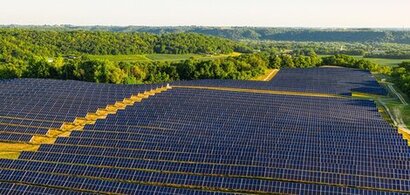
Nigel Billingsley, Partner and Head of the National Utilities & Infrastructure Team North, has called for a national plan to be issued, by the Government, to ensure the country remains on progress towards its 2035 goal of all electricity being produced by clean energy sources.
The current delay on renewable energy projects is causing much frustration from landowners across the country. Mr Billingsley advocates a strategic overhaul at the very top.
“The main issue is that there is no current strategic overview of capacity” Mr Billingsley said. “Network Operators are responding to individual connection requests, rather than a defined national connection plan, which would allow companies to build future growth in capacity, without a specific project to deliver that capacity. Labour has indicated it has a plan for a Great British Energy company, similar to when the National Grid built much of the country’s existing electricity transmission infrastructure during the 1950s and 60s. We need to take a step back and look at the wider picture of what is going on. These projects take years to get from start to finish at the moment, and at current pace the 2035 target will not be met.”
According to the National Grid, 40 percent of projects face a connection delay of ‘at least a year’. The current situation has been described as one of the biggest challenges the National Grid has faced since it was set up in 1935.
“When a lot of the country’s existing electricity infrastructure was put in place between the 1950s and 60s, we had a lot of skilled resources when it came to putting pylons up and the myriad of skills needed for this” added Mr Billingsley. “The Central Electricity generating Board was responsible for generation and Transmission and could lay down and deliver a national Plan. However, the skill base had reduced during the intervening period, until now. As a result, this talent just simply is not present in the current workforce, there is not the knowledge available to deliver the required schemes, this also comes at a time when substantial land agent resources remains working on HS2. We would suggest that training courses are implemented across the country, to encourage more of these critical skills to be re-integrated into society, which could help progress schemes at a more rapid rate.”
Bruton Knowles works for several renewable energy companies, as land agents on a variety of renewable projects. These projects are primarily made up of wind and solar power, along with the installations of battery energy storage systems, which allow for storage of the electricity generated by these renewable methods.
Mr Billingsley added that many clients have experienced huge delays in agreed projects, due to the delay in grid connections.
“The availability of a grid connection is a key factor in enabling renewable development, as we also act for clients when it comes to connecting these renewable sites to the Transmission and Distribution networks” Mr Billingsley said. “Clients are finding they are not able to fully maximise and develop their sites due to these limitations of the current connection capacity. This has led to a race to get capacity from competing sites, which is unlikely to enable to full development of the UK’s capacity for this renewable generation. There needs to be a balanced, comprehensive plan mapped out, which will help the country meet its 2035 target of all electricity to be produced by renewable means. Changes in legislation may assist with progressing connection projects but we will need to maintain a balance between stakeholders, landowners and developers. This inevitably results in a time delay for projects, and there are ultimately limited resources to deliver such projects, which in turn contributes to delivery delays. This process can be time consuming and take years to resolve, but there must remain a balance between the impact of the energy project, the environment and the landowners and wider stakeholders, who are impacted by the current problems.”
For additional information:

